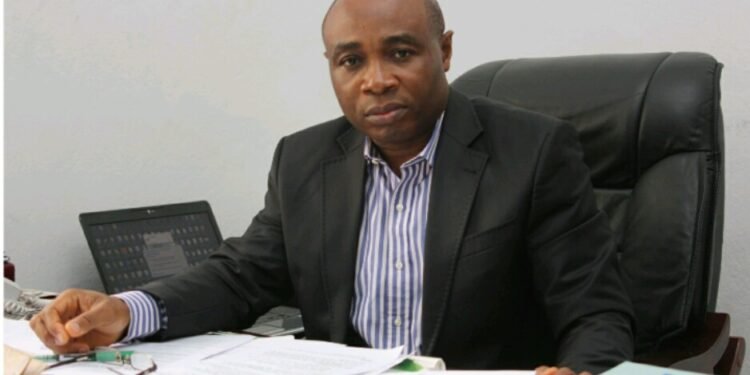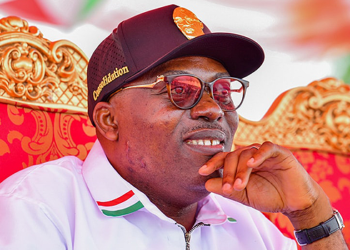(INTERVIEW)
Industrialisation is often touted as the most important economic development in human history, and key to solving unemployment and socio-economic problems in any given society, particularly Nigeria. Unfortunately, governments fail to key into this important economic developmental drive.
In this interview with METROWATCH’s Ogochukwu Isioma, Dr Silva Opusunju, a thought leader in Industrial Law and Senior Partner, Silva Opusunju and Associates, Constitutional Lawyer and Chieftain of the Peoples Democratic Party (PDP) in Rivers State, discusses the past and the future of Rivers State’s industrial sector which the Governor-elect, Siminalayi Fubara, has the ‘best’ industrialisation plan.
What are your thoughts on industrialisation?
Opusunju: By way of definition, industrialisation is the process of transforming the economy of a country or region from a focus on consumption to a reliance on manufacturing (Investopedia, 2022). Simply put, industrialisation is the development of industries in a nation or region on a wide scale. It involves an extensive re-organisation of an economy for the purpose of manufacturing mass-produced and technologically advanced goods and services. Industrialisation is characterised by exponential leaps in productivity, shifts from rural to urban labour, and increased standards of living. In fact, industrialisation can be considered the most important economic development in human history.
And the key elements or ingredients of industrialisation or industrialised society?
Opusunju: Raw material. This is crucial in the industrialisation process for various reasons. In fact, you can’t talk about industries without raw material. Only the availability of the raw material could make it possible for the industries to increase their production. Moreover, the lack of raw material could result in the failure of the industrial revolution for any country or region. For instance, the availability of raw cotton makes it possible for the cotton textile industry to grow.
Another key ingredient is Energy. To me, energy is the most important tool for the rapid industrialisation of any nation or region. According to the World Bank, Nigeria has the largest energy access deficit in the world. This is because 85 million Nigerians – representing about 43 per cent of the population – do not have access to grid electricity. Consequently, inadequate electricity supply has proven to be a major impediment to the economic development plans of successive governments in Nigeria and a significant constraint to businesses and citizens. Adequate access to reliable and affordable power is, therefore, a catalyst for industrialisation. To address the energy deficit in the country and drive industrialisation, Nigeria must begin the exploitation of other energy resources like solar, wind, biomass and hydropower. The country should increase her electricity supply because this would significantly stimulate her industrialisation and economic growth, as the direct effect of electricity on economic growth cannot be overemphasised.
We also have the skilled labour. Without labour, the industrialisation process cannot be complete. You need the skilled labour to operate, for instance, machines. You may have robots in place but trust me, humans remain the best skilled labour out there. I mean, these machines will not operate themselves.
And of course finance. You may have the best vision or plans, but trust me, without finance or say sponsorship, you go nowhere. It is just like a vehicle with a flat tyre. Without replacing the flat tyre, your vehicle go nowhere.
Growing up, we used to hear of the Trans Amadi Industrial Layout in Port Harcourt, which was once considered as the industrial hub of the Garden City, placing Port Harcourt as one of the fastest growing economies in Africa. But things seem to have drastically changed …
(Cuts in) Opusunju: The development of the Trans Amadi Industrial Layout in Port Harcourt, the Rivers State capital, was conceived and spearheaded by Dr. Micheal Okpara, then premier of the Eastern Region to promote manufacturing in that region. The industrial layout occupies 2,500 hectares of land, and shares boundaries with D-Line, Woji and Rumola. There were more than 500 companies and businesses whose operations include hospitality industries, banking, manufacturing, oil and gas, and breweries. The area also accommodates the multi-billion naira Rivers State gas turbine, and the popular Port Harcourt Zoological Garden. But, today, the industrial activities synonymous with Trans Amadi Industrial Layout have phased out. The area is like a ghost town, with only a few companies operating fully. All the likes of Fortune Batteries, West African Glass, Michelin Tyres, Coca-Cola, etc, and many others have either downsized, phased out or relocated due to the lack of these necessary ingredients required for industrialisation, and unfavourable business environment. Out of the few surviving companies, only a handful of them are into industrial manufacturing, which was the major feature of Trans Amadi.
During the glory days of the Trans Amadi Industrial Layout; some companies in the area operated 24 hours to meet up with production or operation demands. There were various jobs for both the skilled and unskilled workers, who kept the area’s industrial rhythm going. In that era, the economy was strong because indigenous companies were producing things on their own and reduced importation drastically, which caused the naira to be stronger than the dollars, making Port Harcourt one of the fastest growing economies in Africa. Our own Port Harcourt competed favourable with the major Nigerian cities, including Lagos, the then capital of the country in Industrial activities. The Garden City, as Port Harcourt is fondly called, was bubbling with activities, and Trans Amadi was the industrial glue that kept the city’s industrial spark on. But all these have now, sadly, disappeared, turning the once bubbling industrial layout into a ghost town with a handful of non-manufacturing companies and estates scattered here and there.
So all hope is lost?
Opusunju: The good news is that present and past administrations in the State have tried to improve the Trans Amadi Industrial Layout’s infrastructure. To begin with, the road network in the area has been upgraded, and the drainage system working smoothly. It is much easier now to move around the layout unlike in the past when its main artery, the Slaughter to Garrison Road was filled with potholes and the sidewalks with open, dirty drains. Also, in 2019, a manufacturing company, the new Alcon Nigeria Limited Low Voltage Panels Assembly Plant started production in the area. Governor Nyesom Wike, who commissioned the place, declared that his administration will continue to work with the private sector to revive manufacturing in Trans Amadi and other parts of the city. The company builds panel for oil companies and oil servicing firms operating in the Niger Delta. It seeks to provide value added quality products to the local market as an authorised channel partner builder with ABB, one of the largest multinational electrical manufacturing companies. That to me is something. Another exciting news is that the incoming administration of Siminalayi Fubara has made it a centre-piece to re-industrialise the State.
We have seen the industrialisation agenda of the Governor-elect, Siminalayi Fubara, for Rivers, in his 37-page manifesto document. Considering that the business environment is complex and fraught with challenges. Do you think the Fubara led administration will succeed …
(Cuts in) Opusunju: Every government is faced with unemployment in their respective states. The good thing is we have an incoming government with a documented people-oriented blueprint for economic growth and industrialisation as envisioned by the Governor-elect, Hon Siminalayi Fubara. His main focus is on engineering the re-industrialisation of Rivers State with appropriate policy, scale, and institutional measures in partnership with the private sector as the engine room of growth. According to Fubara, a prosperous Rivers State is built on many core factors, one of which is industrialisation. He believes that Rivers State should focus on providing an enabling environment for businesses to thrive and encourage foreign investment. In Fubara’s view, these initiatives will create long-term economic stability, create jobs, and attract more investors to Rivers State. I couldn’t agree more. Fubara would develop and implement a 10-year re-industrialisation master-plan to provide the road map for achieving the industrial transformation of the State, while encouraging private investors to take over and revive state companies, and continue to improve the ease of doing business in the State to attract local and foreign investors to quicken industrialisation in Rivers. Fubara is convinced that with the right strategies and infrastructure, Rivers State could become a major economic hub in the region.
The incoming Fubara-led government would implement a business-friendly fiscal regime and incentives for the private sector, and further liberalise the processes for the acquisition and registration of land titles, including the issuance of certificates of occupancy for commercial, industrial, manufacturing and agriculture purposes. That’s not all. The government promises to provide incentives for indigenous entrepreneurs to expand their businesses or start new business ventures in the State, and establish a sovereign Wealth Fund for the State. The Fubara government is equally out to encourage the private sector to build industrial and business parks in each of the senatorial districts of the state, establish and strengthen the Rivers State Investment Company to coordinate the State’s industrialisation drive, and collaborate with the Federal Government to re-activate the existing seaports and railway lines in Rivers State. The Fubara policy promises to facilitate the establishment of economic hubs in mechanized agriculture, manufacturing, digital economy, and oil and gas in partnership with the private sector, and support the growth of micro, small, and medium-scale businesses in the State.
Let us support the incoming government of Siminalayi Fubara to take Rivers State to new levels of enviable height, sustainable peace, security, progress and prosperity. Fubara’s policies will bring the much-needed change and development to Rivers. It is intended to drive economic growth, improved infrastructure, create jobs and reduce poverty in the state. These are indeed key elements for the State to achieve its vision for the future, and we believe in the Fubara’s vision of making the State an investment destination in Africa, with the implementation of the manifesto. Come to think of it, Rivers has what it takes both in human and mineral resources, the quality of professionals in various fields both in the diaspora and here at home as well as abundant resources is second to none. With Fubara, it is our firm believe that our Trans Amadi Industrial Layout will bubble again.










